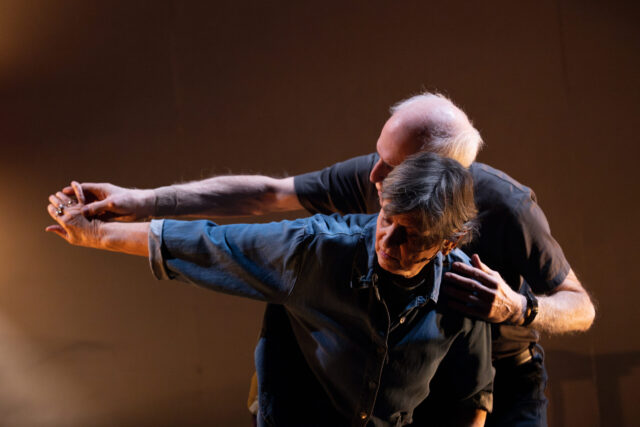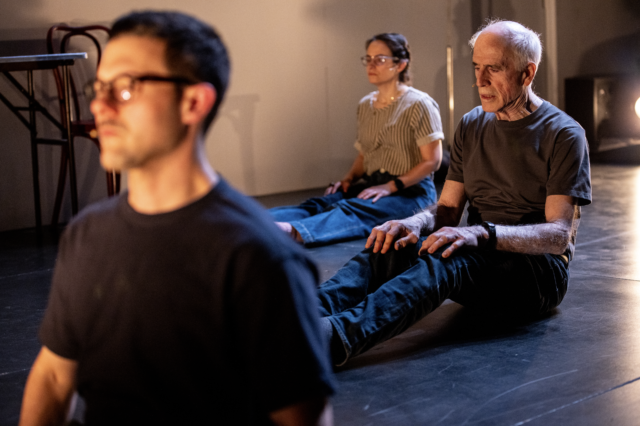
Ellen Maddow and Paul Zimet explore their relationship on- and offstage in The Following Evening (photo by Maria Baranova)
THE FOLLOWING EVENING
Perelman Performing Arts Center (PAC NYC)
251 Fulton St.
Tuesday – Saturday through February 18, $69
pacnyc.org
The Following Evening is a touching love letter to independent theater creators and New York City. It also goes much deeper than a proverbial passing of the torch.
The seventy-five-minute work, making its world premiere through February 18 at PAC NYC, was written and directed by Abigail Browde and Michael Silverstone specifically for Ellen Maddow and Paul Zimet. Browde, forty-two, and Silverstone, forty-three, started the experimental company 600 Highwaymen in 2009, the same year they got married. Maddow, seventy-five, and Zimet, eighty-one, cofounded the experimental company Talking Band, with Tina Shepard, in 1974 and got married in 1986. (Zimet and Shepard had been wed previously as well.)
Browde and Silverstone have a young child and are considering leaving New York. Maddow and Zimet have three grandchildren and can’t imagine living anywhere other than the city, especially with two more shows coming up, Existentialism at La MaMa later this month and Shimmer and Herringbone at Mabou Mines @122CC in May as part of their troupe’s fiftieth anniversary season.
In the play, the two couples portray somewhat fictionalized versions of themselves as they explore their lives and creative process. The line between fact and fantasy is further blurred by Jian Jung’s set, which features a piano on one side, a few chairs in the middle, and a pile of large canvases collected at the right, except for one painting of a window, taunting us about the world outside. In the back, large white sheetrock panels cover only some of the wall, a constant reminder that we are not in Ellen and Paul’s downtown loft but in a theater. In addition, Eric Southern’s lighting often keeps it bright, as if the characters are not actors but just people sharing their time with the audience.
The show opens with Paul delivering a long prologue, moving his hands and body in sharp, heavily mannered ways as he discusses being raised on the Upper West Side, riding his bike, dropping out of medical school, and performing around the globe. He talks about his family history going back to his great-grandmother, who was born in New York City in 1863, and continuing through Ellen and their children and grandchildren, setting up the multigenerational aspect of the narrative.
“Does this all sound romantic? I really hope it doesn’t,” he says. “Nothing is going to happen in this play.” He then turns to Ellen, asks if she is ready, and welcomes the audience to The Following Evening.
Ellen brings up disappointment, memory, and variation as the couple dances, then sings a song for their neighbor, an ill painter named Katherine. “I imagine a play that takes place over a thousand years,” Ellen says, never wanting their life in the theater to end. Paul, ever hopeful, later adds, “I imagine a play about the end of the world. Where the world is crumbling. Civilization on fire. But it is a love story.”

The Following Evening brings together two theater couples at different stages of life (photo by Maria Baranova)
In the second section, Abby and Michael enter, directing Ellen and Paul. When Ellen is having trouble with a scene, she says resignedly, “I had it yesterday. This is the thing about getting older.” Paul immediately counters, “You don’t have any harder of a time than any other actor.” When Abby suggests they improvise, Ellen quickly points out, “No, I like the way you wrote it,” praising the ideas of the next theatrical standard-bearers even though the older couple is more confident about the future than the younger pair.
“Hmm. I just had this, uh. I just got incredibly jealous. You guys have so much life ahead of you,” Paul says, to which Abby replies, “Oh. Isn’t that funny? I don’t feel any of that.” Michael later opines, “I can see the two of you so clearly. I can sort of see you. But I can’t see myself. . . . You were pioneers and we are just — jerks.”
The third and final part focuses more on Abby and Michael as they examine the state of their existence, sometimes speaking in the third person, describing their actions to each other. “I feel like I could run / Like I could run really fast if I wanted to / That you would keep pace with me,” Michael says. “It wouldn’t be that hard / We could go on forever. We could do it.” Abby explains, “Here, hold this, you tell me as if we are the last people on earth.”
They are eventually joined by Ellen and Paul, and the last moments grow even more abstract than what came before.
The Following Evening is like a visual tone poem, a brutally honest look at aging and artistic creation. Things occur slowly, in movement and speech; the dialogue is spoken plainly, unadorned, carefully modulated but not dispassionate. Ellen and Paul are marvelous together; watching them slowly take off their shoes, sit on the floor, or dance together is aspirational.
Abby and Michael are compelling as the younger couple who fear they will never be like Ellen and Paul, either as a married couple, parents, grandparents, or theater makers. All four of them have their fair share of doubt and questions, but the play puts a defining emphasis on experience in a country where the elderly are not given the respect they deserve, something 600 Highwaymen (A Thousand Ways, The Fever) is rectifying, without being overly congratulatory or sentimental about Talking Band (Lemon Girls or Art for the Artless, Painted Snake in a Painted Chair), which collectively has won fifteen Obie Awards.
The title promises that life goes on; I can’t wait to see what each couple has in store for us next evening.
[Mark Rifkin is a Brooklyn-born, Manhattan-based writer and editor; you can follow him on Substack here.]